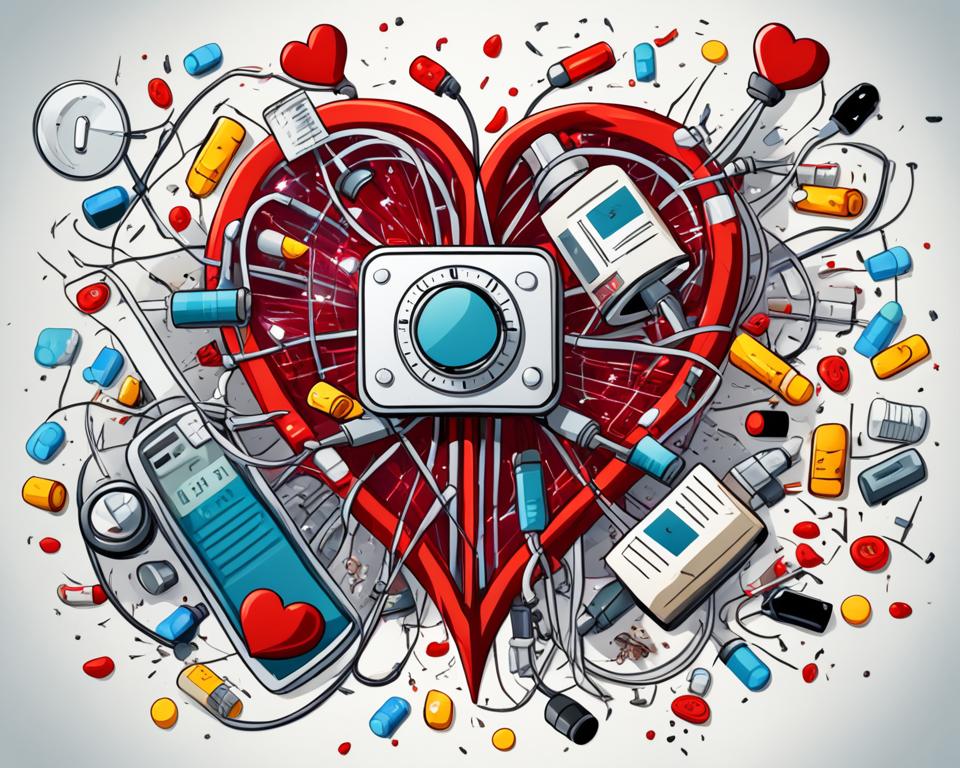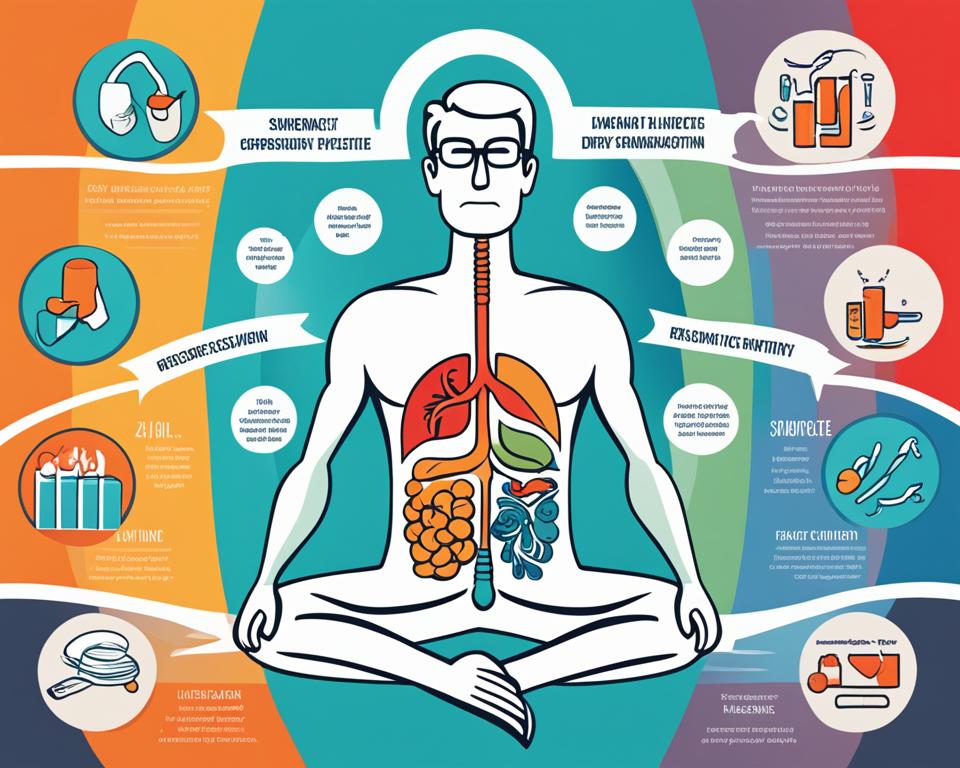Are you dealing with erectile dysfunction? You’re not by yourself! Many men, aged 40 to 70, face this issue, also known as impotence. Let’s take action and improve your sexual health.
Erectile dysfunction makes getting or keeping an erection hard. This can cause stress, frustration, and problems in relationships. But there’s good news! Effective treatments exist to help you beat this challenge and feel more confident.
To find the best solution, it’s key to know what causes your erectile dysfunction. Factors like heart disease, high blood pressure, and being overweight can affect it. Mental health issues, such as depression and anxiety, can also influence it. Knowing what’s causing it helps decide on treatment.
There are many ways to treat erectile dysfunction. Options include pills, self-injections, vacuum pumps, and penile implants. Your doctor can help choose the best one for you. Talking to a psychologist or sex therapist can also be a big help.
Remember, you’re not alone in this. Taking steps to tackle erectile dysfunction and finding the right treatment can bring back your sexual strength. It can also make you feel better overall.
Key Takeaways:
- Erectile dysfunction affects many men between 40 and 70 years old.
- There are many treatments, like medications, injections, pumps, and implants.
- Talking to a doctor is important to understand the cause and find the best treatment.
- Dealing with erectile dysfunction can reduce stress, improve relationships, and make you more confident.
- Getting support from others can really help you through this.
What Causes Erectile Dysfunction?
Erectile dysfunction is a tricky issue. It’s caused by many things, both in the body and mind. Knowing why it happens helps us fix it. Let’s look at what usually causes this problem.
Physical Factors
- Heart disease
- High cholesterol levels
- High blood pressure
- Diabetes
- Obesity
- Smoking
Things like high blood pressure can hurt blood flow. This makes it hard to keep an erection. Taking care of your health can help with ED.
Psychological Factors
- Depression
- Anxiety
- Stress
How we feel inside matters a lot for sex. Bad feelings can make ED worse. Feeling good in your mind helps a lot.
ED usually comes from both body and mind issues. Finding the root cause is key. This helps doctors find the best way to help.
Erectile Dysfunction Symptoms
Knowing ED symptoms is important. They include:
- Difficulty getting or maintaining an erection for sexual activity
- Inconsistent ability to achieve an erection
- Reduced sexual desire
If these things are happening, talking to a doctor is a good idea. They can figure out why and talk about ways to make things better.
Image:

We’ve looked at the causes and symptoms of ED. Next, we’ll learn how doctors figure out if someone has it.
Diagnosing Erectile Dysfunction
Talking about erectile dysfunction with your doctor is key. It might feel tough, but it’s very important. Your doctor will look at your medical past and do a physical exam. This helps them figure out what’s causing the issue. It’s important to be open and not feel ashamed. Doctors are used to dealing with this and can really help. To check for physical problems, your doctor will do some tests like checking your blood pressure and looking at your genitals. These steps are normal and help find the right treatment for you.
If your case is complex, you might need more tests or see a specialist. This happens if you have other health issues that might affect your condition. These extra steps help your doctor understand your situation better. Then, they can make a plan that works for you.
Getting help for erectile dysfunction is a common part of health care. Being honest with your doctor is the first move to getting better. This can help improve your sexual health.
Key Points:
- Diagnosis of erectile dysfunction begins with a physical examination and an open discussion with your doctor.
- Basic health checks and examinations of the genitals are typically performed to rule out any physical causes.
- Further tests or consultations may be necessary, especially if you have underlying medical conditions.
- Diagnosing erectile dysfunction is a routine process that healthcare providers are experienced in handling.

Treatment Options for Erectile Dysfunction
There isn’t just one way to fix erectile dysfunction. What works depends on why it’s happening and how bad it is. Let’s look at some popular and effective choices.
Oral Medications
Drugs like sildenafil (Viagra), tadalafil (Cialis), vardenafil (Levitra), and avanafil (Spedra) changed how we treat this issue. They improve blood flow to the penis. This helps start and keep an erection.
These pills really help lots of guys, in a simple and private way. But, it’s smart to talk to a doctor before you start using them. They’ll make sure the pills are safe for you.
Self-Injections and Urethral Suppositories
If pills don’t work or aren’t right for you, there are injections and urethral pellets. You inject medicine into your penis or put a small pellet inside your urethra. These help by opening up the blood vessels in your penis. That way, more blood can get in and you can get an erection.
Vacuum Penis Pumps
A vacuum penis pump is another way to treat erectile dysfunction without surgery. You put your penis in a tube and a vacuum pulls blood into it. This makes you get an erection. Then, you put a ring at the base of your penis to keep the erection.
Pumps work well for some men. It’s key to follow the directions when using them.
Penile Implants
For serious cases, when nothing else works, penile implants can be an option. This surgery puts a device in your penis. You can pump it up when you want an erection.
This choice is usually the last one tried. You should think about the pros and cons carefully. Talk to a doctor who specializes in this field.
Counseling and Therapy
When your mind plays a part in erectile dysfunction, therapy helps a lot. Talking to a psychologist or sex therapist can deal with emotional or mental blocks. These sessions offer new ways to think, coping skills, and support. They help you and maybe your partner, too. Asking for help shows strength and can make your life and relationships better.
Summary of Treatment Options
| Treatment Option | How It Works |
|---|---|
| Oral Medications | Increases blood flow to the penis |
| Self-Injections and Urethral Suppositories | Widens blood vessels in the penis |
| Vacuum Penis Pumps | Draws blood into the penis using a vacuum |
| Penile Implants | Surgically places a device in the penis |
| Counseling and Therapy | Addresses psychological factors |
Remember, talking to a healthcare provider is the first step. They’ll figure out what’s going on with you. They’ll share options and find the best plan for you. With the right help and plan, you can beat erectile dysfunction and feel better about your sex life.

Lifestyle Changes for Managing Erectile Dysfunction
Making healthy changes in your life can greatly help with erectile dysfunction. These changes help both your overall health and your symptoms. It’s all about adding good habits to your daily life.
1. Maintain a Healthy Weight
Becoming overweight can make erectile dysfunction worse. By losing extra weight, your blood flow gets better. This improves how your erections feel and work.
2. Quit Smoking
Smoking can really hurt your blood vessels, making blood flow tough. Stopping smoking is great for both your sex life and your general health.
3. Follow a Healthy Diet
Eating too much processed food and sugar is bad for your heart. Choose a diet full of fruits, veggies, grains, lean meats, and healthy fats instead.
4. Exercise Regularly
Physical activity is key. It gets your blood moving and reduces stress. Try to get at least 150 minutes of exercise like walking each week.
5. Reduce Stress and Anxiety
Stress and worry can mess with your sexual performance. Use deep breathing, meditation, or yoga to lower stress. This helps your sexual health a lot.
6. Limit Alcohol Intake
Drinking too much alcohol is not good for sexual function. Keep it to less than 14 drinks a week to stay healthy.
7. Avoid Excessive Cycling
Cycling is great but don’t overdo it. Too much time on a bike can harm blood flow to the penis. Make sure to take breaks and use a good bike seat.
8. Address Underlying Health Conditions
Things like high blood pressure can cause erectile dysfunction. Talking to your doctor and getting these conditions under control is important.
With these lifestyle changes, you can improve your sexual health. It’s all about making lasting habits for a healthier life. Remember, quick fixes aren’t the answer to enjoying better well-being.

Seeking Support and Communication
Erectile dysfunction can be tough, both emotionally and in relationships. It’s key to talk to your partner and keep communication open. Erectile dysfunction is common and not a shame. Getting support from loved ones and professionals can lower anxiety and help you manage.
Talking to others who have been in your shoes can help. There are support groups and online resources to help you.
“Talking openly is important for dealing with erectile dysfunction. You’re not alone in this. Seeking help shows strength, not weakness.”
The Benefits of Seeking Support:
- Emotional relief: Talking about your feelings with people who get it can help you stress less.
- Practical guidance: Doctors can give advice and treatments just right for you.
- Relationship support: Talking things over with your partner can make your bond stronger and help you both understand the situation better.
- Educational resources: Support groups and online communities have lots of good info and tips for dealing with erectile dysfunction.
| Support Resources | Contact Information |
|---|---|
| National Erectile Dysfunction Association | Website: www.neda.org |
| Sexual Health Support Hotline | Phone: 1-800-SEX-HELP |
| Online Support Group | Website: www.edcommunity.com |
Conclusion
So, gentlemen, don’t let erectile dysfunction stop you from having a good sex life. It’s common and many men face it. Luckily, there are many treatments available.
But it’s not all about treatment. Staying at a healthy weight, stopping smoking, and less stress helps too. So, start making healthy changes now.
If this problem feels too big, don’t worry. You’re not alone. Talk to your partner, family, and doctors. They can help and give you support.
So, embrace the journey to beat erectile dysfunction. With the right treatment and support, plus some humor, you’ll get to a happier sex life. Remember, you have the power to overcome this!

